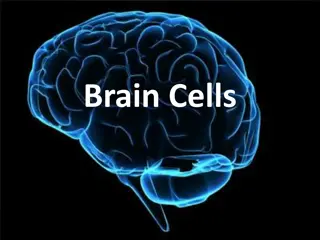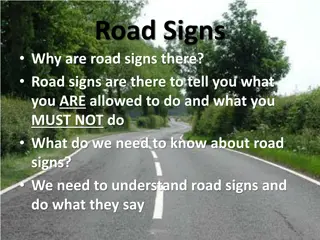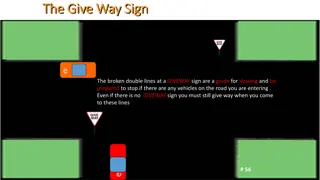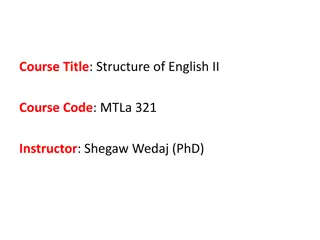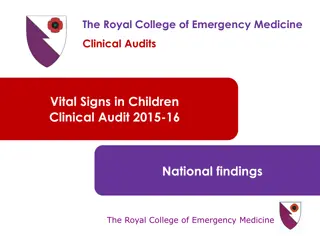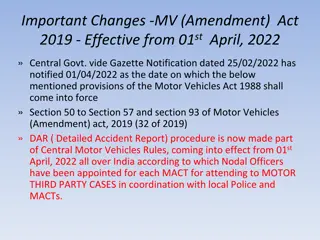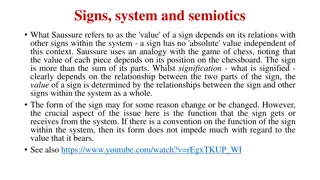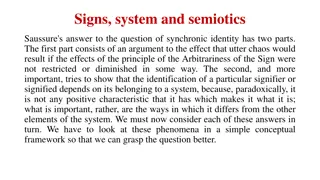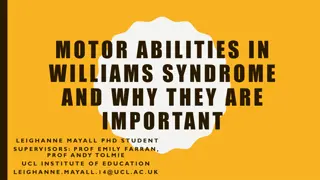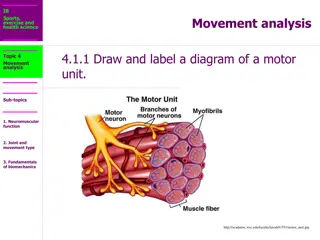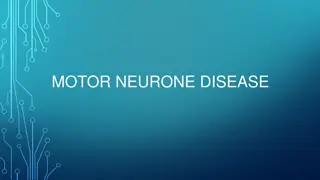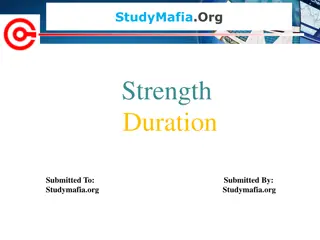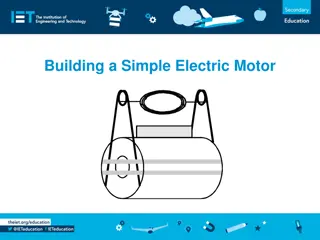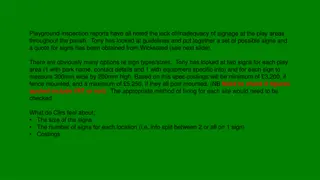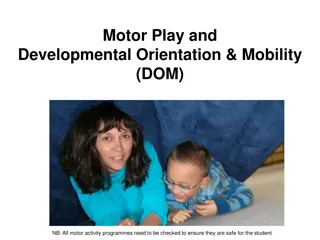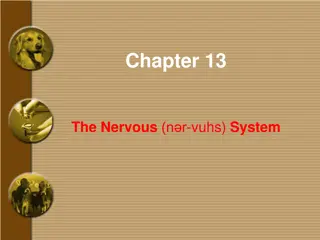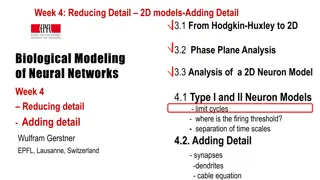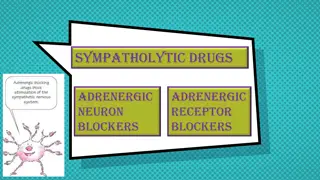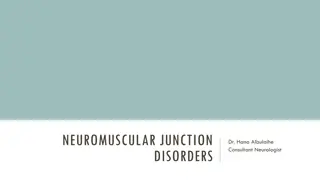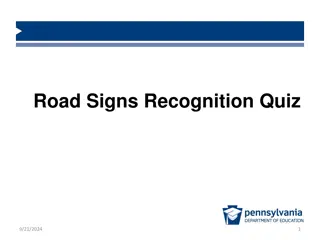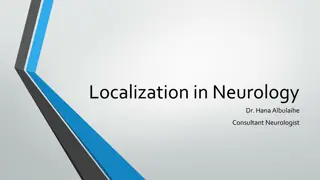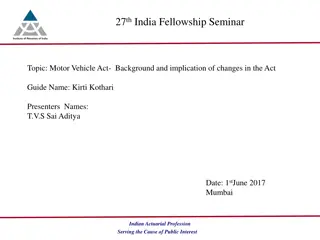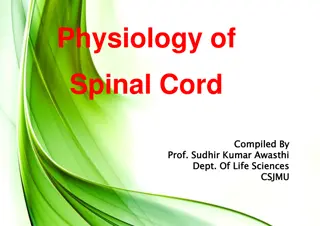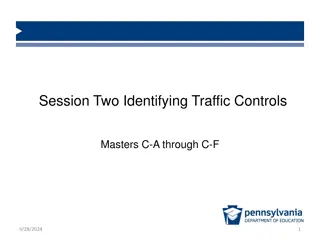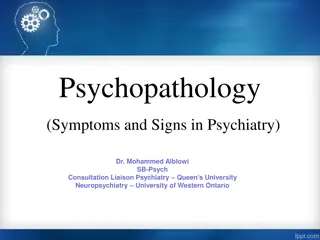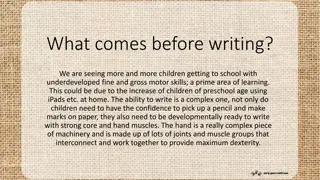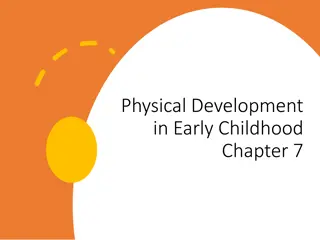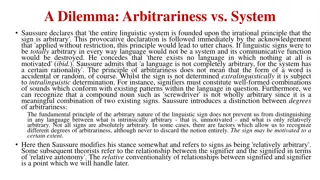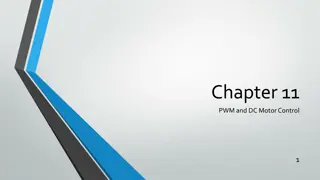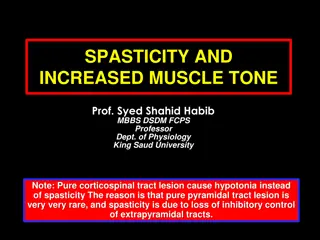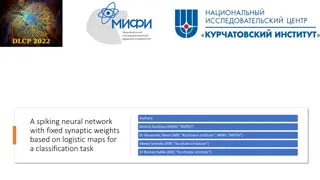Controlling DC Motor using PictoBlox
Learn to control a DC motor using PictoBlox programming by setting the direction and speed of the motor, using a potentiometer and slide switch. Understand what a DC motor is, how it functions, and how to control its speed. Explore circuit diagrams, motor controlling blocks, and the process of contr
1 views • 20 slides
Brain Cells
Delve into the fascinating world of brain cells and neurons to understand their structure, function, and communication process. Explore the microscopic level composition of the brain, the significance of neuron shapes, and the intricate workings of synapses in transmitting signals between neurons. U
1 views • 14 slides
Understanding Road Signs and Safety Measures
Road signs are essential for providing guidance and ensuring road safety. They convey important information about regulations, warnings, and directions to motorists and pedestrians. Understanding the meanings of various road signs is crucial in navigating roads safely. This guide explores different
0 views • 6 slides
Road Traffic Signs and Markings Overview
Understanding road traffic signs and markings is crucial for safe driving. From Give Way signs to double solid lines, each element serves a specific purpose to regulate traffic flow and ensure road safety. This comprehensive guide breaks down the meaning and importance of various road markings such
0 views • 15 slides
Understanding Structural Linguistics: An Exploration of Language and Signs
Delve into the intricate world of structural linguistics through an in-depth analysis of language components, linguistic signs, and the relationship between language and linguistics. Explore the concepts of syntagmatic vs. paradigmatic relations, linguistic signs as associations of sound and meaning
4 views • 62 slides
Understanding Elder Abuse and Its Signs
Elder abuse can take various forms such as physical, psychological, financial, sexual abuse, and neglect, causing harm and distress to older individuals. Recognizing the signs of elder abuse is crucial to protecting vulnerable seniors in our communities. Signs can include physical injuries, unexplai
0 views • 9 slides
National Findings on Children's Vital Signs in Emergency Medicine
This clinical audit by The Royal College of Emergency Medicine in 2015-16 focused on assessing emergency departments' performance against clinical standards related to vital signs in children. The audit objective was to identify current performance levels and facilitate quality improvement. The stan
0 views • 21 slides
Understanding Electromyography (EMG) and Motor Neurons
Electromyography (EMG) is an electrodiagnostic technique used to evaluate muscle health by measuring electrical activity. EMG measures muscle response to nerve signals, displayed as waves on an oscilloscope. Motor neurons transmit signals from the brain to muscles, enabling movement. Upper motor neu
2 views • 8 slides
Important Changes in Motor Vehicles Act 1988 and Motor Vehicles Amendment Act 2019
Central Government has announced amendments to the Motor Vehicles Act 1988 and Motor Vehicles Amendment Act 2019 effective from April 1, 2022. The changes include the implementation of Detailed Accident Report procedures, appointment of Nodal Officers for motor third party cases, and definitions rel
1 views • 18 slides
Understanding Signs, System, and Semiotics According to Saussure
Saussure's concept of sign value emphasizes the importance of relationships within a system, where a sign's meaning is not absolute but dependent on its interactions with other signs. He highlights the distinction between signification and value, showcasing how signs derive their value from the syst
0 views • 10 slides
Innovative Agromate Device for Remote Motor Control
Control your motor from anywhere with the innovative Agromate telemetric device, enabling remote operation via a simple missed call. This device offers solutions to common farming challenges such as power cuts, wild animals, and rough weather. Agromate works with any service provider's SIM card and
0 views • 31 slides
Understanding Signs, Systems, and Semiotics in Linguistics
Saussure's theory of signs emphasizes the relationship between a signifier and a signified, highlighting the importance of belonging to a system of differences. Signs, as interpreted meaningful entities, play a crucial role in semiotics, shaping our understanding and communication. The concept of si
0 views • 11 slides
Motor Abilities in Williams Syndrome and Their Importance
Motor abilities play a crucial role in the developmental journey of individuals with Williams Syndrome. From simple reflex movements to fine and gross motor skills, these abilities impact daily living, academic achievements, and overall cognitive and physical growth. Research on motor skills in both
0 views • 20 slides
Understanding Motor Units and Neurotransmitters in Muscle Contraction
Motor units consist of a motor neuron and the muscle fibers it innervates. Neurotransmitters like acetylcholine play a vital role in stimulating muscle contraction by transmitting signals at the neuromuscular junction. This communication between neurons and muscles is essential for proper movement a
0 views • 30 slides
MOTOR NEURONE DISEASE
Motor Neurone Disease (MND) is a rare condition affecting the brain and nerves, leading to loss of motor function. There is no cure for MND, and it can impact adults and children, causing symptoms like muscle weakness, speech difficulties, and changes in personality. The Irish Motor Neurone Disease
0 views • 7 slides
Understanding Strength-Duration Curve in Neuromuscular Stimulation
The strength-duration curve depicts the relationship between electrical stimulus intensity and time required for minimal muscle contraction. It helps assess nerve damage in lower motor neuron lesions. Various types of curves exist based on innervation status, such as normal innervation, complete den
0 views • 15 slides
Building a Simple Electric Motor Experiment
Learn how to build a simple electric motor step-by-step, including winding the field coil, making end contacts, attaching to a battery, preparing the coil, and assembly. Troubleshooting tips are provided if the motor doesn't work. Experiment ideas include changing the motor's direction, radio interf
0 views • 8 slides
Effective Strategies for Children with Developmental Language Disorder, Sensory Processing Disorder, and Fine Motor Delays
Children with Developmental Language Disorder (DLD), Sensory Processing Disorder (SPD), and Fine Motor Delays often have accompanying sensory and fine motor deficits. Research indicates that addressing sensory processing deficits can significantly benefit children with DLD, ADHD, autism, and other d
0 views • 61 slides
Proposal for Play Area Signage Improvement
Playground inspection reports highlighted the need for signage improvements in play areas across the parish. Tony has researched guidelines and proposed a set of possible signs with cost estimates from Wicksteed. The options include various sign types and sizes, with two signs suggested for each pla
0 views • 15 slides
Enhancing Development Through Sensory and Motor Play
Motor play and developmental orientation are essential for children, especially those with vision impairments. Encouraging movement and play helps in developing confidence, purpose, and motor skills. Activities like bouncing, crawling, and climbing aid in brain organization, spatial awareness, and e
1 views • 24 slides
Understanding the Nervous System: A Comprehensive Overview
The nervous system consists of the central nervous system (CNS) and peripheral nervous system (PNS), with neurons as its basic unit. Neurons function as sensory, associative, and motor types, carrying impulses within the body. Parts of a neuron include the cell body, dendrites, axon, and terminal en
2 views • 86 slides
Recognizing Signs of Child Abuse and Preventing Harm
Children often exhibit signs of abuse through changes in behavior, and it is important for adults to be vigilant and proactive in identifying and addressing these signs. This includes watching for inappropriate behaviors, nightmares, withdrawal, secretive behavior, sudden personality changes, and mo
0 views • 28 slides
Exploring 2D Neuron Models and Phase Plane Analysis
Dive into the transition from Hodgkin-Huxley to 2D neuron models, understanding phase plane analysis, and analyzing different neuron types like Type I and II models with a focus on limit cycles, firing threshold, and separation of time scales.
0 views • 43 slides
Understanding Adrenergic Neuron Blockers: Mechanisms and Pharmacological Effects
Explore the mechanisms of action of adrenergic neuron blockers and classify adrenergic receptor blockers into selective and non-selective categories. Delve into the pharmacokinetic aspects and pharmacodynamic effects of these blockers, such as false transmitter formation, store depletion, release in
0 views • 29 slides
Understanding Spasticity and Increased Muscle Tone in Neurological Disorders
Spasticity and increased muscle tone are common features in neurological disorders, characterized by hyperactive stretch reflexes and muscle contractions. Spasticity is velocity-dependent and associated with upper motor neuron lesions, leading to increased resistance to passive movement. Rigidity, o
0 views • 28 slides
Understanding Upper and Lower Motor Neuron Lesions: Effects and Manifestations
This content delves into the intricacies of upper and lower motor neuron lesions, detailing their effects and manifestations in the human body. It explores the causes, types of paralysis, reflexes, muscle tone changes, and the impact of lesions at various levels of the motor system. The insights pro
0 views • 45 slides
Understanding Neuromuscular Junction Disorders with Dr. Hana Albulaihe
An in-depth exploration of neuromuscular junction (NMJ) anatomy, physiology, and associated disorders by Dr. Hana Albulaihe, a renowned Consultant Neurologist. The NMJ comprises the axon terminal of a motor neuron and the motor end plate of a muscle fiber. Disorders discussed include Myasthenia grav
0 views • 75 slides
Road Signs Recognition Quiz - Test Your Knowledge of Traffic Signs
Get ready to test your knowledge of road signs with this quiz! Each sign will flash for 0.3 seconds, and you will have 10 seconds to write down its meaning. Challenge yourself and see how well you can identify different traffic signs.
0 views • 117 slides
Understanding Neurology: Localization, Neuroaxis Structures, and Motor Neuron Signs
Explore the intricate world of neurology with a focus on brain localization, neuroaxis structures, and the distinctions between upper and lower motor neuron signs. Delve into the functions of brain lobes, brain stem anatomy, and spinal cord functions. Discover how upper motor neuron signs indicate l
0 views • 52 slides
Implications of 2017 Motor Vehicle Act Amendment
The 2017 Motor Vehicle Act Amendment focuses on reducing road accidents, providing speedy treatment to victims, and establishing a Motor Vehicle Accident Fund. It introduces several key objectives, amendments, and insertions like e-Governance, higher penalties, and improvements in licensing. The ame
0 views • 16 slides
Understanding the Physiology of the Spinal Cord
The spinal cord serves as the information highway between the brain and body, allowing for sensory input reception and motor signal transmission. It plays a crucial role in locomotion, reflex responses, and overall coordination of muscle activities. The cylinder of nerve tissue within the vertebral
0 views • 18 slides
Identifying Traffic Controls: Regulatory, Warning, Guide Signs & More
This presentation covers the identification of various traffic controls including regulatory signs, warning signs, guide signs, traffic light signals, lane markings, and pavement markings. The objectives include recognizing signs based on color, shape, and symbols, understanding traffic light signal
0 views • 8 slides
Understanding Psychopathology: Symptoms and Signs in Psychiatry
Psychopathology involves the study of symptoms and signs in psychiatry, where signs are objective observations and symptoms are subjective experiences. Mental disorders encompass a range of issues affecting thoughts, emotions, behaviors, and relationships. Recognizing signs and symptoms such as slee
0 views • 31 slides
Developing Fine and Gross Motor Skills in Children for Effective Writing
Children's motor skill development is crucial for successful writing. Prior to writing, children need adequate muscle development, starting from gross motor skills to fine motor control. Activities and strategies for improving both types of motor skills are essential in preparing children for succes
1 views • 5 slides
Approach to Acute Flaccid Paralysis in Children: Evaluation and Management
Acute muscular weakness in children is a neurological emergency defined by sudden onset muscle weakness or paralysis in less than 5 days. When evaluating a child with acute flaccid paralysis, consider factors like onset rhythm, associated symptoms, and past medical history. A thorough physical and n
0 views • 45 slides
Early Childhood Physical Development Overview
Physical development in early childhood encompasses growth in height and weight, brain development, gross motor skills, and fine motor skills. Children's bodies change significantly between ages 3 to 6, with notable improvements in motor skills and cognitive abilities. Gross motor activities such as
0 views • 15 slides
The Principle of Arbitrariness in Linguistic Signs: Saussure's Insight
Saussure's declaration on the arbitrariness of linguistic signs is thought-provoking, emphasizing that while signs are arbitrary, complete arbitrariness would lead to chaos. He distinguishes between degrees of arbitrariness and acknowledges that signs are not entirely arbitrary, being subject to lin
0 views • 9 slides
DC Motor Control Techniques and Configurations
This chapter delves into various aspects of PWM and DC motor control, exploring characteristics of selected DC motors, rotation mechanisms, H-bridge configurations for motor direction control, logic configurations for motor operation, bidirectional motor control using an L298 chip, pulse width modul
0 views • 27 slides
Understanding Spasticity and Muscle Tone Disorders
Spasticity is a motor disorder characterized by increased muscle tone and exaggerated reflexes, typically associated with upper motor neuron lesions. This article explains the differences between upper and lower motor neuron lesions, the neurophysiology of spasticity, causes, effects, and treatments
0 views • 23 slides
Spiking Neural Network with Fixed Synaptic Weights for Classification
This study presents a spiking neural network with fixed synaptic weights based on logistic maps for a classification task. The model incorporates a leaky integrate-and-fire neuron model and explores the use of logistic maps in synaptic weight initialization. The work aims to investigate the effectiv
0 views • 8 slides

